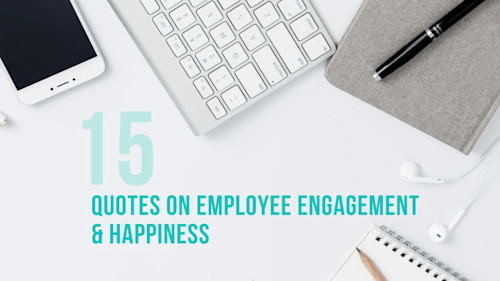5 Reasons Your Company Has Poor Employee Loyalty
October 30, 2019

Is employee loyalty a thing of the past? Research points to yes. Why? Workplace demographics are shifting. Millennials now between ages 25 and 39 years old, will officially dominate the workforce beginning in 2020 (35%).
The state of employee loyalty (or lack there of)
Is employee loyalty a thing of the past? Research points to yes.
More than any other generation before, those born between 1980 and 1996 are more likely to transition quickly from company to company throughout their careers.
Why? Workplace demographics are shifting. Millennials now between ages 25 and 39 years old, will officially dominate the workforce beginning in 2020 (35%).
The way that millennials approach their careers is vastly different from their baby boomer parents. "Career employees are no longer dreaming of the day they retire with gold watches at the age of 65. Today's employees are thinking of themselves more as free agents in a sports franchise." The median tenure for workers age 25 to 34 is now a mere 3.2 years.
It's clear that employee loyalty has changed, which could be a direct correlation of the fact that technology has changed, education has changed, access to new opportunities has changed, and the traditional career trajectory has changed. The list goes on….
We’ve rounded up 5 reasons employees are switching companies quicker than ever before and why employee loyalty is dwindling.
Why do employees jump ship?
POOR ENGAGEMENT
According to Gallup, just 33 percent of American workers are engaged by their jobs. Fifty-two percent say they're "just showing up," and 17 percent describe themselves as "actively disengaged."
Understanding the workforce's mindset is critical because employee engagement is about how people feel about their responsibilities, environment and purpose.
Even just a handful of actively disengaged employees, can have a net negative effect on the workplace and lead to turnover or toxic company culture. Maintaining employee engagement should be one of HR's top priorities, especially as a company scales. Employee engagement strategies will look different to each company.
HIGHER SALARY
More than 35% of 18-34-year-olds ranked compensation as the top motivating factor to leave their job (Ceridian). However, a higher salary isn't always enough of a motivating factor to change jobs for an employee who is very happy with their role, responsibilities, and environment. 45% of working adults are willing to give up some percentage of their salary, about 8.6% on average—all for more flexibility at work.
Alas, there are money motivated individuals who can supercharge their earning power at an accelerated rate, only by switching companies vs. staying in the same position for an extended period. Nearly a third of millennials say they'll be chasing higher salaries at another employer five years from now (Staples). The corporate ladder is no longer vertical, it's shaped more like a zig-zag, and it's a path where high-performers no longer have to be okay with being capped by glass ceilings.
LACK OF LEARNING & GROWTH OPPORTUNITIES
Breaking news: employees want learning and growth opportunities, and we're not just talking promotions. We're talking about companies providing the option for people to expand their skill set, knowledge, and taking on new challenges that aren't always within the scope of their job descriptions.
Imagine doing the same task day in and day out with zero room for skill development or any advancement. Work would be pretty dull, wouldn't it? As humans, it's in our nature to learn, mature and advance as we age, and this applies to our careers as well. A job that lacks growth opportunities and avenues for leadership development is a job that 67% of millennials would leave.
Research shows that 90% of Millennials want to grow their careers with their current companies; they're just not being allowed to—so they leave for somewhere they can.
ROLE ADVANCEMENT
People also leave jobs for a higher title and leadership responsibilities.
In the 1950s to the end of the 20th century, people would often remain at their company anywhere from 5 to 25 years. The goal was to work your way up from a junior position to mid-level, to management and beyond. Eventually, one would hit a glass ceiling depending on their skillset and experience, where advancement was unlikely.
However, in the 21st century, when the Internet age exploded, things began to change. With the click of a button, employees have access to thousands of job opportunities. They are no longer confined by location as the amount of remote work available continues to increase.
High performers, especially in-demand positions like software engineering, literally have a carrot (shiny new opportunities) dangling in front of their faces every single day. 42% of millennials contemplate leaving their current job to advance their careers. Companies who don't offer the opportunity for their employees to move up and forward will end up losing their high-performers.
POOR CULTURE
The culture conversation has become a heated topic in the age of social sharing. With the click of a button on websites like Glassdoor, employees are quick to voice culture issues, which include anything from a lack of inclusion and diversity, poor communication, ineffective upper management or conflict on teams.
According to the report, "Employees who rate their culture poorly are 24 percent more likely to leave." It's a lot easier to join a new company with a unique company culture than to single-handedly change the culture of the company you're currently at.
The environment and way team members treat one another is a crucial part of employee happiness. Employees who say there's a low level of respect among colleagues are 26 percent more likely to quit their jobs.
In the future of work, culture matters more than ever.
Final Thoughts…
Think of your employee's as awesome Airbnb guests that who you want to stay, but know eventually will leave and move on to their next adventure. Making the employee experience as positive and attractive as possible will help retain star players, while also help attract new talent to replace those that do end up leaving.
Workplace loyalty is not dead; it just requires a fresh perspective and ownership from companies. It takes an understanding that employees need to feel a sense of belonging and purpose in order to continuously feel engaged at work.
Get Started
Start building your recognition culture with us today.
Ready to make a difference in your employees’ lives and watch your company culture thrive? Contact us to speak with a member of our passionate team.

